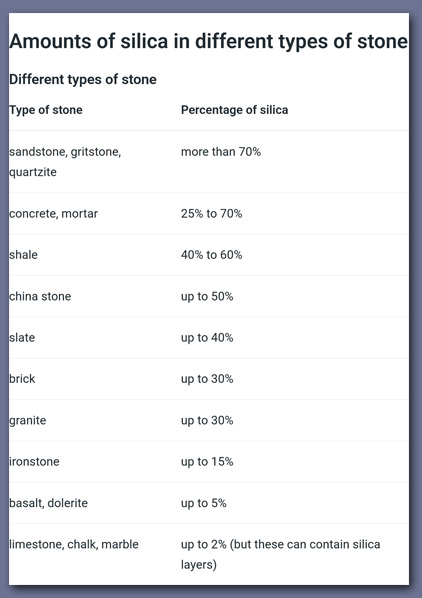Doctors Call Ban Popular Kitchen Worktop Material Linked to Deadly Lung Disease
Despite concerns voiced by doctors in August 2024, about artficial and machineed stone that has replaced natuarl granite, which causes a devistating lung disease when its dust is inhaled; nothing seems to have been done, other than manufacturers being relied upon to adhere to HSE advice to avoid the risks involved to their workers producing the product. Relying upon 'cowboy' employers and workers to use PPE and safe working practices, is hardly an assuraty thsat the disease of silicosis which kills, is being avoided by the industry.
Artificial, or “engineered,” stone — a cheaper alternative to natural granite or marble — contains extremely high levels of silica. When cut or polished, it can release fine dust particles that, if inhaled, can cause silicosis, a progressive and often fatal lung disease.
Researchers have now confirmed eight cases of silicosis in the UK among men with an average age of 34. Some developed the disease after working with artificial stone for as little as four years, according to a study published in the medical journal Thorax.
“What’s really striking is that it’s affecting young people in their 20s and 30s — and there’s no treatment for it,” said Dr Jo Feary, consultant in occupational lung disease at the Royal Brompton Hospital and senior clinical research fellow at Imperial College London. “If they didn’t do their job, they wouldn’t have the disease. We need urgent action.”
 Dr Feary, the study’s lead author, warned that many more cases are likely to emerge as the use of artificial stone continues to rise in the UK. The material, made from crushed rock bound with resin and pigments, is easier to shape than natural stone — but often cut in conditions with poor dust control.
Dr Feary, the study’s lead author, warned that many more cases are likely to emerge as the use of artificial stone continues to rise in the UK. The material, made from crushed rock bound with resin and pigments, is easier to shape than natural stone — but often cut in conditions with poor dust control.
One of the eight patients studied has since died. All cases involved “dry cutting and polishing artificial stone worktops with inadequate safety measures,” the researchers reported.
The study’s authors urged the government to consider following Australia’s example, where engineered stone was banned earlier this year after a surge in silicosis cases.“National guidelines are urgently needed, as well as work to identify at-risk workers,” the paper said. “A UK ban on artificial stone must be considered.”
Silicosis occurs when silica dust causes inflammation and scarring in the lungs, making breathing progressively more difficult. The disease has no known cure, though some patients have received lung transplants. Symptoms include persistent coughing, fatigue, and shortness of breath that can become debilitating.
In an accompanying editorial, Dr Christopher Barber of Sheffield Teaching Hospitals warned that silicosis could soon become a “significant challenge” for the NHS, drawing parallels with past industrial health crises. He noted that banning silica-based tools in the 1920s successfully protected Sheffield’s cutlery workers.
Meanwhile, further research led by Dr Patrick Howlett of Imperial College London suggests that lowering the legal limit for silica dust exposure could help prevent new cases.
A spokesperson for the Health and Safety Executive (HSE) said the agency was reviewing potential measures to strengthen worker protections. This despite the inadequate insection regime which means employers police themselves,whilst continueing to put workers at risk.
“We continue to work with industry to raise awareness of the risks from respirable crystalline silica and are considering options for future interventions,” the HSE said.
With cases already emerging and the disease’s irreversible nature, experts say preventing exposure is now critical — and that the UK may soon need to choose between tighter regulation or an outright ban on engineered stone.
Source: Independent / HSE
Go to the E-Library to download an advisary from the HSE using search word 'Silica'

